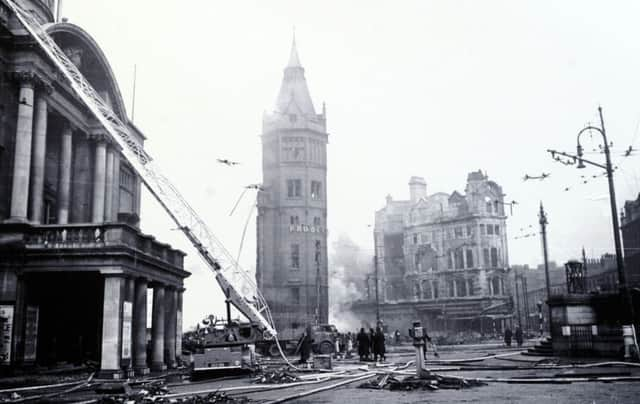Why has BBC ignored Hull’s suffering in the Blitz?


Hull was the most devastated city in the UK per square mile - even more than London - but a Government notice preventing its naming for reasons of national security was only lifted in the 1970s.
Its role has subsequently been largely forgotten outside the city, despite by efforts by local historians to raise its profile.
Advertisement
Hide AdAdvertisement
Hide AdAlan Brigham, the chairman of the Hull People’s War Memorial, which has raised £100,000 towards a memorial to the 1,200 people, who died during the wartime bombing, said the city had been overlooked once again.
The series Blitz Cities takes celebrities back to their hometowns to discover more about the Luftwaffe’s attacks.
It starts on Monday with actor Shane Richie taking to the skies over London.
With the help of an archaeologist he revisits the route the German bombers would have taken, and finds out how the River Thames was used by the enemy to navigate at night.
Advertisement
Hide AdAdvertisement
Hide AdHe then meets Blitz survivors to talk about their experiences. The series continues with Mylene Klass (Norwich) Ricky Tomlinson (Liverpool), John Humphreys (Cardiff) and David Harewood (Birmingham).
Mr Brigham suggested actress Maureen Lipman would have been a perfect choice to front up a programme.
He said: “Hull was the most devastated town or city in the UK. In the Commonwealth it was second only to Malta.
“London had more bombs, with Hull the second highest, but with Hull being so much smaller, the bombs were concentrated into a smaller area.
Advertisement
Hide AdAdvertisement
Hide Ad“It is a disgrace that it is being forgotten. We have bombarded them with enough information. The D-notice was lifted in 1976, so it’s about time the BBC got their fingers out and started doing some research in the archives.
“It was the same with the National Arboretum - Hull was missed off four or five years ago - when I checked they said they didn’t know Hull had been bombed. It happens again and again.”
Historian Robb Robinson, whose family spent three years in the 1950s living in a Nissen hut as a result of the post-War housing shortage, due to the bombing, added: “I am a bit staggered given that it is well known now that people in Hull get very offended when the Blitz on Hull is forgotten. It’s amazing that it is being missed out given what the people there endured. This seems to be taking the confusion of history and celebrity too far.”
The city’s industry, railways and docks were a key target for the Luftwaffe. It was also an easily identifiable target, sitting at the confluence of the rivers Hull and Humber.
Advertisement
Hide AdAdvertisement
Hide AdSuch was its strategic importance, the authorities did not want the Nazis to know the damage they were inflicting, and as a result it was simply referred to as a “North-East” town or “northern coastal town” during reports.
With 93 per cent of homes damaged or destroyed, the War affected virtually every family in the city.
Some 152,000 people were rendered homeless, over half the population, as a result of 82 raids which went on throughout WW2.
The city suffered the country’s first daylight raid in June 1940 and the last daylight land raid towards the end of the war in March 1945.
Advertisement
Hide AdAdvertisement
Hide AdThe BBC said: “To mark the Anniversary of the Blitz, the series sends famous faces on a trip around – and above - their home city to meet the people who lived through the bombing. As such, the cities were chosen because of the celebrities’ association with them.
“With only five episodes in total, we finally settled on London, Birmingham, Cardiff, Liverpool and Norwich.
“Although focusing on these particular cities, however, we hope the series as a whole does reflect the country’s experience during these years.”
Wartime Home Secretary Herbert Morrison took another view. Dozens of British towns and ports were attacked, but in his autobiography he concluded: “in my experience the town that suffered most was Kingston-upon-Hull.”